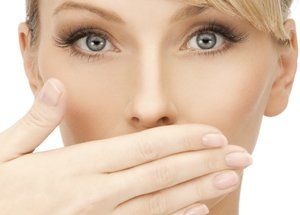Bad Breath (Halitosis) Treatment
Everyone occasionally experiences halitosis (bad breath). For example, morning breath is a common condition caused by the reduced saliva flow at night (saliva helps wash away food and bacteria in the mouth, keeping the breath fresh). In most cases this is considered normal. However, persistent bad breath can signal dental or other health problems and needs to be addressed.
What if I suspect I have bad breath?
How do you find out if you have halitosis? People are almost never able to detect when their breath is unpleasant because the nose becomes adapted to one’s own smell. Your dentist can also help you assess whether you have a problem with halitosis. Dentists receive extensive training in dental school about identifying and treating the many different causes of bad breath.
Causes of halitosis:
- Inadequate dental hygiene
- Periodontal (gum) disease
- Dry mouth (xerostomia), which can be caused by certain illnesses or medications
- Infections of the respiratory tract, such as throat, lung and sinus infections
- Systemic illnesses like diabetes, liver disease, lung disease, kidney disease and acid reflux
- Cigarette smoking and chewing tobacco
- Certain foods and beverages, like onions, garlic and coffee
In most cases bad breath originates in the oral cavity. Even a healthy mouth contains millions of bacteria. The moist, warm conditions in the mouth are an ideal environment for bacteria to thrive. Without regular and thorough brushing and flossing, food particles will remain in the mouth, creating an unpleasant odor.
Chronic halitosis can also be a warning sign of periodontal (gum) disease. Plaque, an invisible film of bacteria, regularly forms in the mouth. As plaque builds up, it can create toxins that irritate the gums, leading to an infection that can lead to tooth loss if left unchecked. Regular dental checkups can help ensure that periodontal disease is detected and treated early.
Another cause of bad breath is dry mouth. Saliva helps neutralize bacteria and wash away food particles. Therefore, conditions that cause dry mouth (including diabetes, Sjogren’s syndrome and conditions that require radiation therapy) or certain medications (such as drugs for allergies, depression and high blood pressure) can lead to bad breath. If dry mouth is identified as the cause of your halitosis, you can help keep your mouth moist by increasing your fluid intake. Your dentist may also prescribe artificial saliva or a special rinse.
Bad breath can be a symptom of respiratory-tract infections like infections of the throat, lungs or sinus cavity. Respiratory-tract infections will usually be accompanied by symptoms like sore throat, fever, stuffy nose, swollen lymph nodes (swollen glands), yellowish or greenish nasal discharge or mucus-producing cough. After reviewing your symptoms and medical history, your dentist may refer you to a medical doctor for additional treatment.
Certain foods and beverages can also cause bad breath. Foods like garlic and onions are absorbed into the bloodstream and eventually expelled from the lungs. Mints and mouthwash mask the odor, but this is just a temporary fix. Dieters also sometimes suffer from halitosis.
In rare cases, halitosis may indicate an underlying systemic illness such as diabetes, liver disease, lung disease, kidney disease or acid reflux. Your dentist can help identify the source of your halitosis and refer you for additional tests or treatment if necessary.
Your dentist conducts a thorough exam and medical history in order to determine the source of your halitosis. In the meantime, here are some things you can do to help reduce halitosis.
Tips for keeping your breath fresh:
- Maintain good dental hygiene—brush the teeth, gums and tongue at least twice per day and floss once per day.
- Use a tongue scraper, cleaning as far back on the tongue as possible.
- Drink plenty of water.
- Visit your dentist at least twice per year for a professional dental examination and cleaning.
- Chew sugar-free gum or suck on sugarless candy.
- Eat foods like raw carrots and celery.
Your dentist may also recommend specific oral rinses or prescription products.
At Georgetown Family Dentistry our dentists are experts in identifying and treating the many different causes of halitosis. We will ask you about your personal habits, diet and medical history, as well as the history of your symptoms. After a thorough physical examination in order to assess the source of the problem, your dentist will provide you with a treatment plan so you can be confident that your breath is fresh and pleasant to others.
Feel free to contact us if you have any questions about halitosis or to schedule an oral health consultation with one of our doctors.
New Patient Special
$99
Dental Exam, X-Rays & Cleaning


